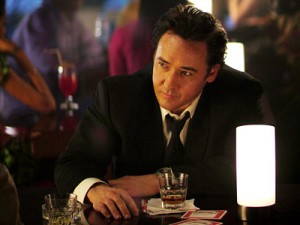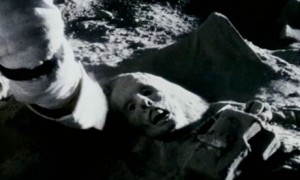WAR INC: 2 ½ STARS +1 STAR FOR AUDACITY = 3 ½
 In the last year a number of movies about the Iraq war have come and gone, barely making an impact with audiences. Well intentioned, but earnest movies like Lions for Lambs, Redacted and In the Valley of Elah were box office poison to a public inundated by images of the war on television. The latest film to comment on the war is a subversive new “what if” satire co-written by and starring John Cusack.
In the last year a number of movies about the Iraq war have come and gone, barely making an impact with audiences. Well intentioned, but earnest movies like Lions for Lambs, Redacted and In the Valley of Elah were box office poison to a public inundated by images of the war on television. The latest film to comment on the war is a subversive new “what if” satire co-written by and starring John Cusack.
Partially inspired by Naomi Klein’s article Baghdad Year Zero, and set in the near future, War, Inc. is a vicious spoof set in the fictional desert country Turagistan. The war torn country is occupied by Tamerlane, a private corporation run by a former US Vice-President (Dan Aykroyd). Once they have completely decimated the place, he reasons, why would they then ignore the entrepreneurial opportunities that arise?
Cusack is Hauser, a hit man (he describes himself as “a morally twisted character from a Céline novel” or “like a reject from the Island of Dr. Moreau”) outsourced by Tamerlane to assassinate a Middle Eastern oil minister (Lyubomir Neikov) who wants to build a pipeline through the country thereby interfering with Tamerlane’s sole proprietorship of the land. Posing as a trade show producer, his cover involves setting up a televised party that will include a pop star’s wedding. Complicating matters are a Central Asian sexpot singer Yonica Babyyeah (Hillary Duff) and a snoopy reporter (Marisa Tomei).
War, Inc is kind of like the love-child of Wag the Dog and Grosse Pointe Blank. It’s darkly humorous, veering from slapstick to sincerity and back to satire with a side trip to soap opera land. The unevenness in tone may trouble viewers uncomfortable with sharp shifts in style, but adventurous viewers may find it exhilarating.
Some of the jokes are obvious—the tanks which patrol the Emerald City safe zone are festooned with advertisements à la Nascar—and some good sight gags are dampened by heavy handed direction—visual gags that are seen in wide shots are needlessly emphasized in close ups—but there is an anarchy to the film uncommon in the mainstream.
There is less and less satire on our screens these days because audiences have to work to get the deeper meaning of the piece and Hollywood doesn’t want people to have to think, they simply want them to buy tickets and popcorn. War, Inc, however, is food for thought. It is outrageous and not easily pigeonholed, but is very clear on where it stands on war profiteers, making interesting comments on the involvement of corporations in the wake of war. Are you listening Dick Cheney?
Showing maimed returning soldiers hasn’t been an effective tool for filmmakers to spark comment on the war, perhaps the jokes and satire of War, Inc. are what it will take to get people to finally respond to a movie that provocatively, but slyly comments on the current situation in the Middle East.

